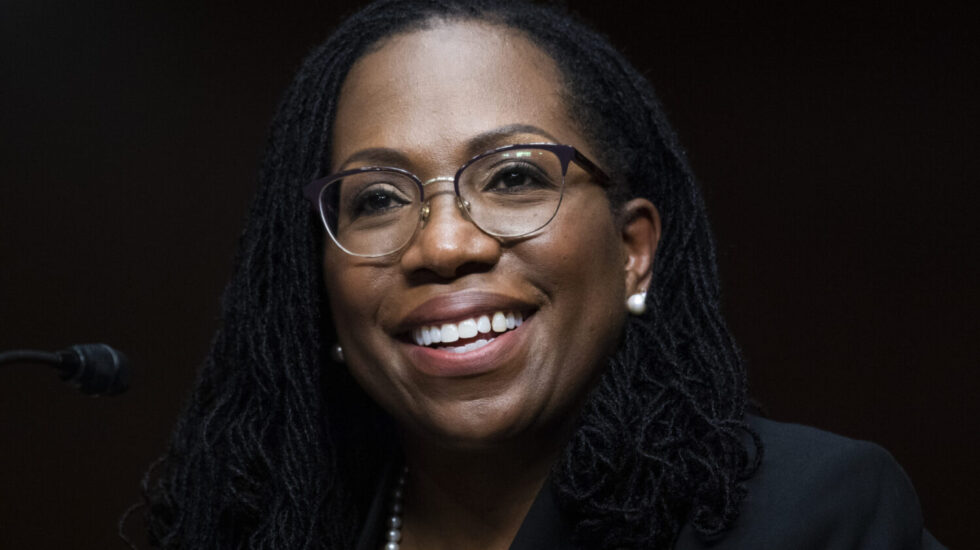The Senate Judiciary Committee questioned Judge Ketanji Brown Jackson for the second consecutive day on Tuesday, prompting the Supreme Court nominee to on expound abortion rights, her defense of detainees imprisoned at Guantánamo Bay, and her personal religious beliefs.
Sen. Lindsey Graham, the sole Republican on the Judiciary Committee to support Jackson when she was nominated for the DC Circuit Court last year, struck a particularly pugnacious tone. He pressed Jackson on an amicus brief she filed while in private practice that argued that Guantánamo Bay prisoners cannot be imprisoned indefinitely, saying she’d be “run out of town” if she took that position during WWII.
Jackson said she was merely representing the opinion of her clients. “When you are an attorney, and you have clients who come to you… you represent their positions before the court,” Jackson said.
She also alluded to her defense of Guantánamo detainees when she was a public defender.
“Federal public defenders don’t get to pick their clients,” Jackson said. “It’s a service. That’s what you do as a federal public defender. You are standing up for the constitutional value of representation.”
She added, “After 9/11, there were also lawyers who recognized that our nation’s values were under attack, and we couldn’t let the terrorists win by changing who we were fundamentally. What that meant was that, the people who were being accused by our government of having engaged in actions related to this under our Constitution’s scheme were entitled to representation.”
That, she said, “is what makes our system the best in the world.”
Graham eventually left the nomination hearing in a huff after getting into a testy exchange with Senator Dick Durbin (D-IL). Graham told Durbin that Guantánamo detainees should be imprisoned until they die, regardless of the expense to U.S. taxpayers.
“I’m suggesting the system has failed miserably and advocates to change the system like she was advocating would destroy our ability to protect our country,” Graham said before departing.
Earlier in the day, Graham pressed Jackson on her religious beliefs.
“What faith are you, by the way?” he asked.
When Jackson answered that she is a nondenominational protestant, Graham countered: “Could you fairly judge a Catholic?”
Later, Graham asked, “So on a scale of one to 10, how faithful would you say you are, in terms of religion?”
Jackson tried to sidestep the question, saying her personal religious beliefs were unimportant and that there’s no religious test in the constitution. Graham then finally arrived at the convoluted point he was trying to make: this line of questioning was “uncomfortable” but exactly the type of queries posed to Justice Amy Coney Barrett when she was a nominee. (The comparison is unfair because Barrett, as a professor, wrote scholarship explicitly informed by her Catholic faith.)
In a response to a question from Sen. Dianne Feinstein (D-CA), Jackson said that Roe and Casey, the two landmark decisions that codified abortion rights in the U.S., are “settled law.”
The Washington Post reports:
Jackson said “stare decisis,” the idea that courts should respect and follow past decisions, is a “very important” principle “that provides and establishes a predictable stability” and “serves as a restraint.”
Similarly, Jackson responded to a gun rights question from Sen. Chuck Grassley (R-IA) by answering, “the Supreme Court has established that the individual right to keep and bear arms is a fundamental right.”
Jackson also rejected Senator Josh Hawley’s (R-MO) accusation – levied on Monday – that she has “a pattern of letting child porn offenders off the hook for their appalling crimes.”
More from The Post:
“As a mother and a judge who has had to deal with these cases, I was thinking that nothing could be further from the truth,” she said. “And in every case, when I am dealing with something like this, it is important to me to make sure that the children’s perspective, the children’s voices are represented in my sentences.”
The judge said the way she makes sure that children’s perspectives are heard is by sharing with defendants the long-term damage of child sexual abuse on the victims.
“I tell them about the victim statements that have come in to me as a judge,” she said. “I tell them about the adults who were former child sex abuse victims who tell me that they will never have a normal adult relationship because of this abuse.”



